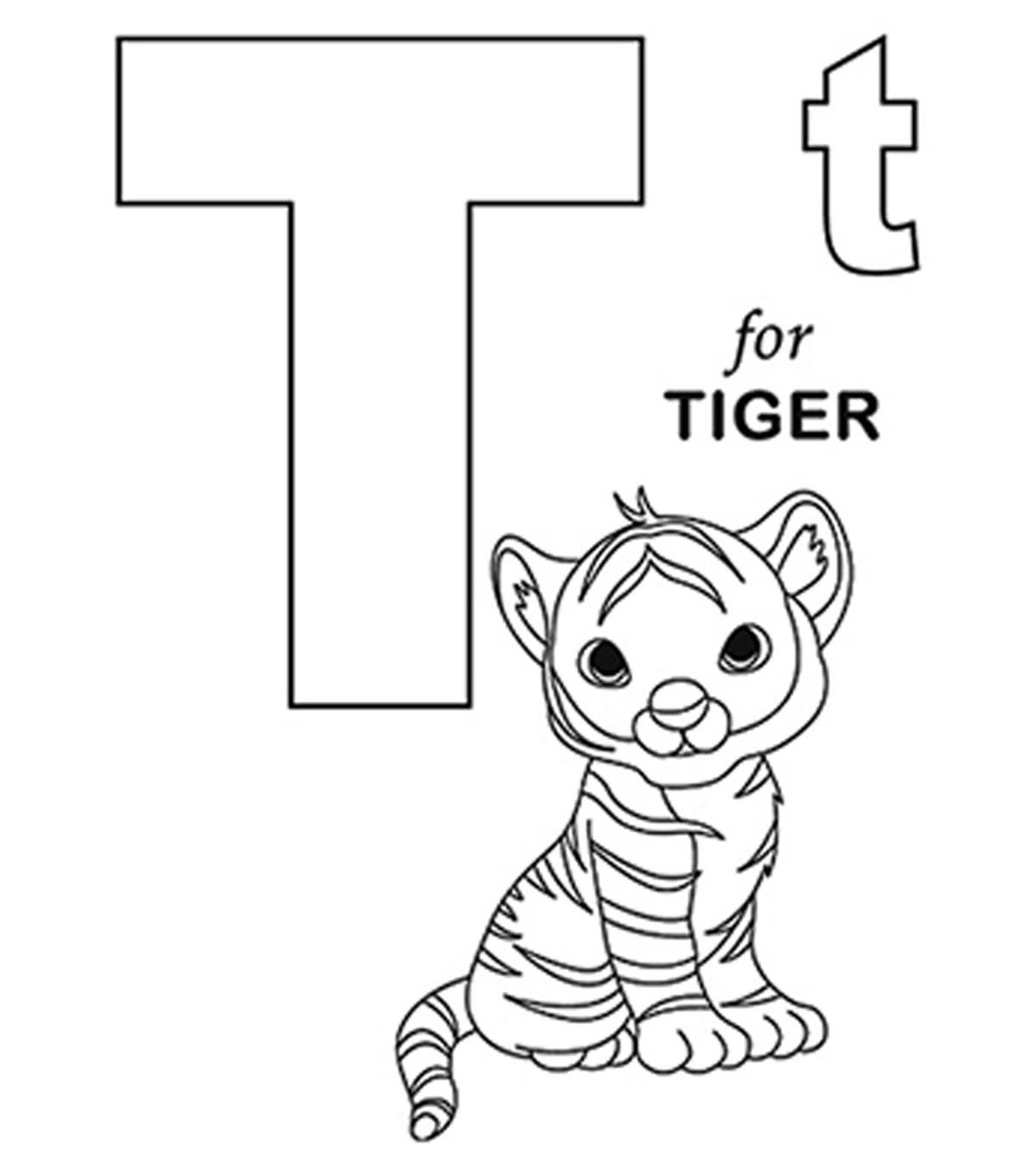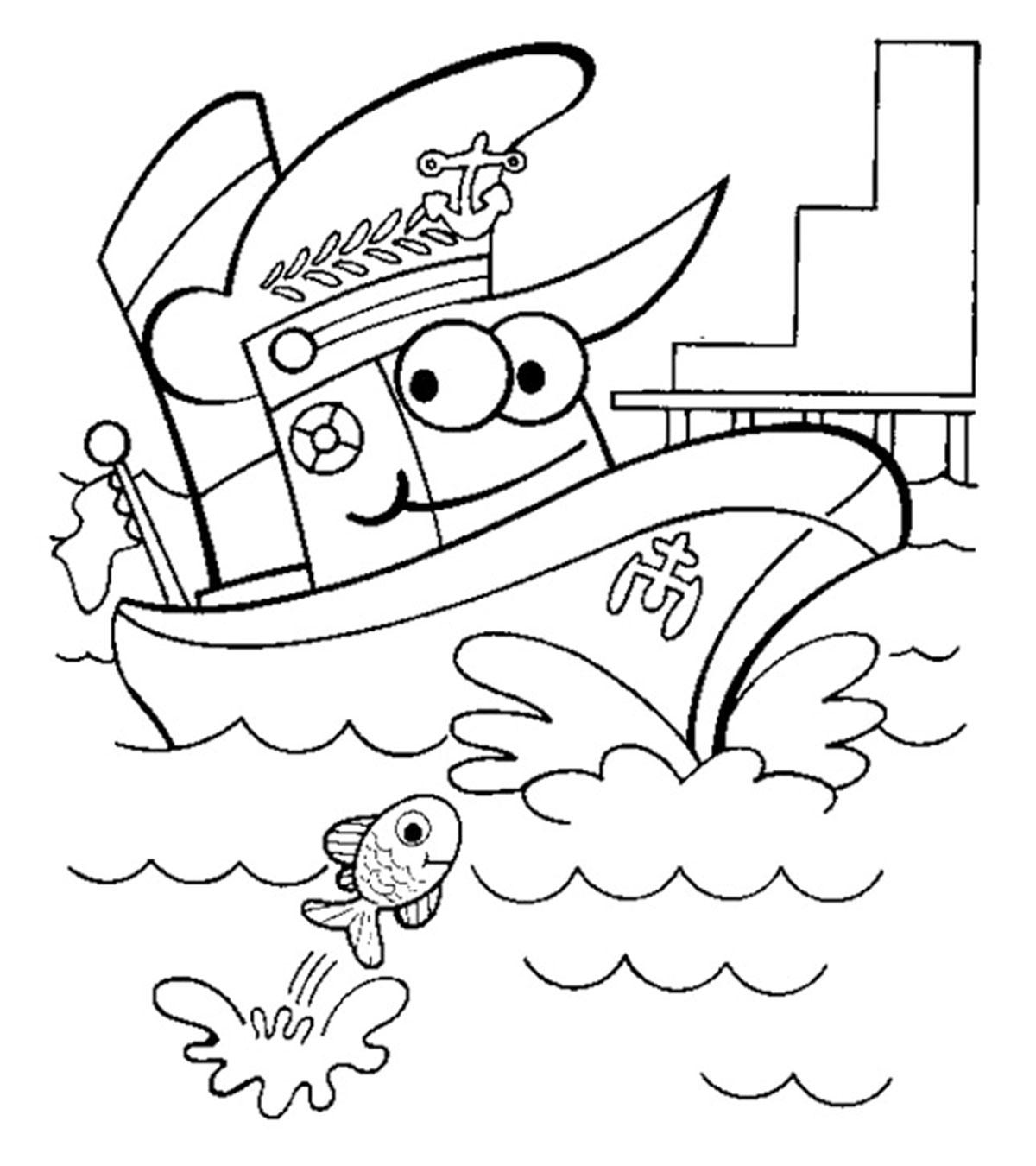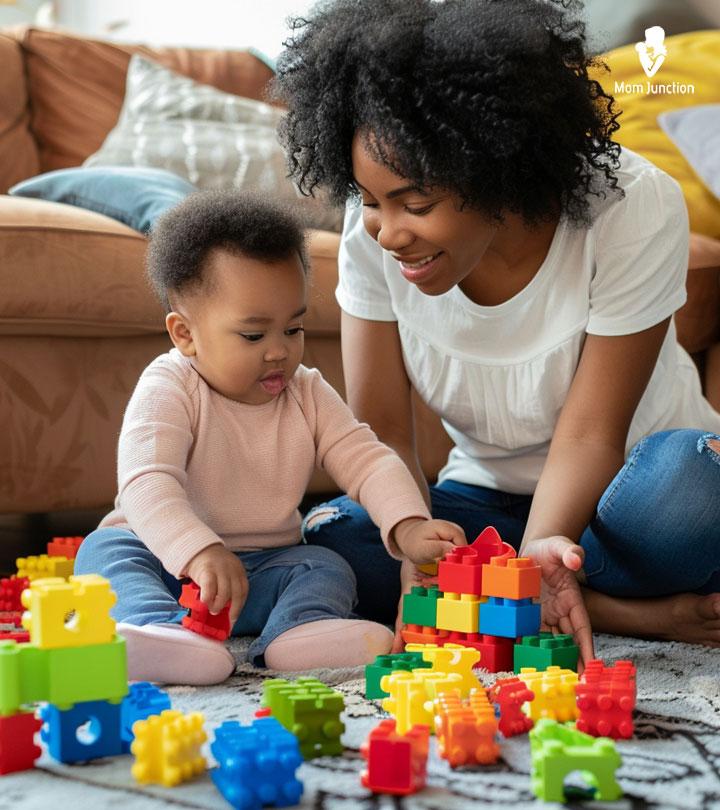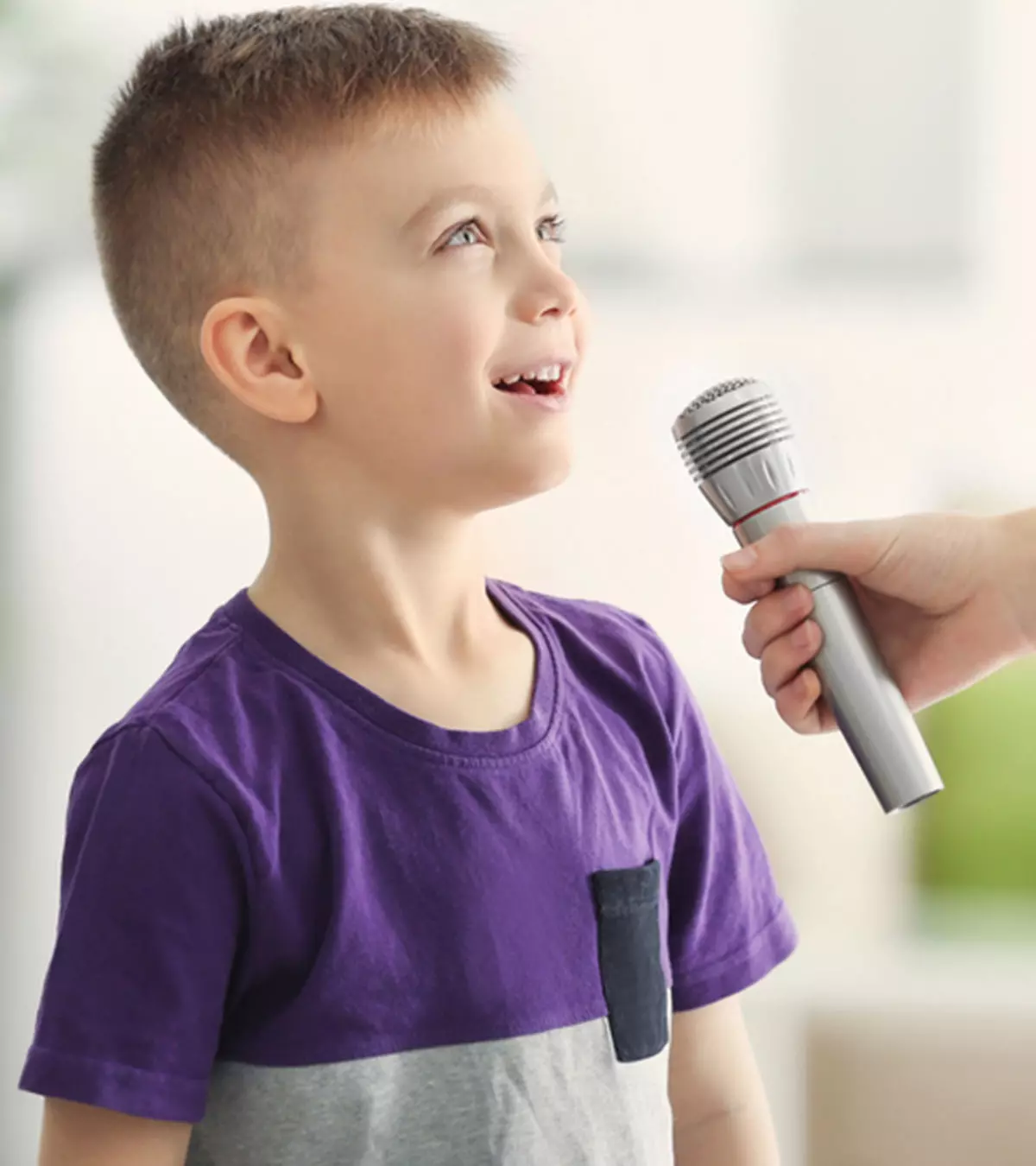
Image: Shutterstock
Communication works for those who work at it. – John Powell
Communication skills for kids are a key developmental aspect, as they can influence a child’s personality. Studies have shown that parents, families, and educators are the key facilitators of good and free communication during early childhood (1). Therefore, parental involvement in children’s communication skills development is critical.
In this post, we share some tips and tricks on improving a child’s communication abilities with the help of fun-filled and interactive techniques. We also tell you about the importance of communication skills for kids and provide tips on how you can support your child during the communication process.
Key Pointers
- Communication skills are vital for children’s personal and professional growth, and parents play a crucial role in developing them.
- Basic communication skills include polite conversation initiation, eye contact, clear speaking, empathy, and appropriate listening and responding.
- Factors that can impact a child’s communication skills are lack of guidance, excessive screen time, and communication disorders.
- Communication games and activities, such as telephone games, picture storytelling, and impromptu, can be enjoyable ways to enhance communication skills.
- Parents must encourage and respond sensitively to their children and seek professional help when needed.
Importance Of Communication Skills For Children
Some believe that effective communication skills are only required for adults, but that’s not the case. Here are some reasons why communication skills are just as important for children as they are for adults.
- Helps children express their ideas, feelings, and thoughts with clarity.
- Facilitates articulation and better learning. This is crucial for your child to excel in academics where learning and meaningful exchange of information is pivotal.
- Promotes consequential exchange of information or feedback with others, a step necessary for the development of interpersonal skills.
- Improves your child’s social skills (social IQ). Social interaction skills, in turn, help enhance personal and professional relationships.
- Boosts confidence and self-esteem.
- Makes children better team players, collaborators, and negotiators, leading to seamless conflict resolution.
Effective communication skills are also crucial for a child to thrive in the intense competition they might face as they grow and become independent.
Basic Communication Skills For A Child
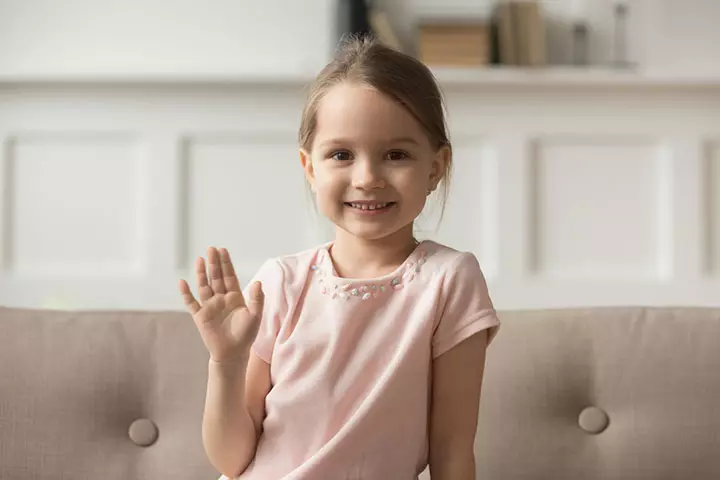
Image: IStock
Here are some of the basic communication skills that are necessary for a child.
- Initiating or entering a conversation with polite enthusiasm: The child can practice this communication habit by greeting people before initiating a conversation. A warm smile and polite tone can strike the right note. For example, when your child meets a guest, guide them to smile, and say, “Hello, how are you?” or ‘Hi, it’s been a long time since we met. Hope you are well!’ The child should also be taught the importance of non-judgmental communication, assertiveness, and persuasion.
- Making eye contact with the listener: This act reflects the child’s respect and interest in the conversation, thus letting the speaker know the child is engaged in active listening. Conversely, looking away or yawning during a conversation indicates disinterest and is considered bad manners.
- Speaking clearly and being audible: This step is necessary for the comfort of a listener. Besides, it indicates that the speaker is confident about what they are speaking. Make your child practice speaking with you and other family members to learn this skill.
- Showing empathy and accepting differences: Understanding the value of empathy is very important. It will help your child know that every individual is different and can have different views. Acknowledging these differences can help your child accept different perspectives.
- Not interrupting a conversation: If your child interrupts a conversation often, it may be an early indicator of poor self-regulation. Make your child aware of the importance of listening by guiding them on the ways to practice it.
- Listening and responding appropriately: Patient listening can help your child gather information without lapses, while responding appropriately shows how well they have received information. Thus, listening and responding accordingly is vital for communication to be effective.
 Quick tip
Quick tip- Completing the communication loop: Whether the communication is formal or informal, there must be a coherent conclusion. Doing so shows one’s interest and respect for the conversation that happened. So, teach your child not to leave a conversation without reaching closure. Here is how your child can know when the conversation has ended:
- It can indicate a closure of the conversation if the speaker says, ‘All right, then, do you have anything else to say or share?’ or ‘It was nice talking to you!’ or ‘I’m glad we got to catch up!’
- Look for non-verbal cues, such as checking their phone or watch, acting distracted, packing up their things, or standing up when they were previously sitting.
These communication skills are basic and can be attained with persistent efforts.
Communication Games And Activities For Kids

Image: IStock
Communication or conversation games for kids are age-specific activities aimed at developing children’s verbal, nonverbal, and visual skills. For toddlers, use simple games like ‘Simon Says’ to improve listening. For older kids, try activities like story cubes to boost public speaking. Regular participation in these games may help develop good conversation skills in your child. Here is a list of games that you can consider trying.
1. The telephone game
This is one of the common group listening activities for children. It’s super fun and can be played with a group consisting of seven or eight children. Here is how you play the game.
- All the players sit in a circle close enough to whisper in the other player’s ear.
- As the game begins, one child/individual whispers a message to the player beside them.
- The same message should be passed by the other player to the player sitting next to them.
- The game continues until all the players in the circle are done whispering to their next player.
- Once the message reaches the last player, ask them to say it aloud. It will be fun to hear what they say.
Start the game with a simple sentence. Once the children understand the game, use more complex sentences.
2. Pointing directions
This is a fine activity to hone your child’s nonverbal communication skills, such as written communication. The game can help your child understand that successful navigation is possible only when the communication is accurate and precise. To facilitate this activity,
- Instruct your child to jot down the directions to a nearby mall or shop.
- Commence a journey with your child following those directions to reach the place.
- Help your child understand how they can improve their communication by writing clear and concise instructions. For example, you could guide them on marking landmarks to easily find the way or mark lane numbers while mentioning left or right turns.
3. Point and tell
This interactive and fun activity may help sharpen your child’s verbal communication skills. In the game, give a random object to your child, and have them speak five to six lines about it.
The object could be anything–such as their favorite dress, lunchbox, or a raincoat. While talking on the topic, your child will express their feelings/thoughts, which can help boost their confidence and enhance their vocabulary, diction, and fluency. The activity also allows the child to practice the correct pronunciation of words.
4. Picture storytelling
Children love stories, and this activity allows them to narrate one. Picture storytelling is an interesting activity wherein your child has to narrate a story based on pictures provided to them.
To do so, the child has to arrange the pictures in an order or logical sequence in which they want to narrate the story. Doing this activity helps your child develop creative communication, process visual cues, and use the interpreted information to communicate better.
5. Presentation
This activity is similar to making PowerPoint presentations. Ask your child to prepare a crisp presentation on paper or a computer. Tell them who the target audience is, and then, let them choose topics such as recycling, saving water, controlling pollution, and using plastic bags. This public-speaking activity can help enhance your child’s oratory skills and boost their confidence to speak before crowds.
6. Impromptu
Impromptu or unrehearsed speech is one of the many ways to sharpen your child’s public speaking skills, especially when they have to communicate without preparation. Write different interesting and fun topics on chits of paper and ask your child to pick one chit and give a speech on it for two to three minutes.
Since the activity is impromptu, your child will get hands-on experience in thinking, articulating, and presenting their ideas, thoughts, and information accurately. To increase the complexity, you may set a time limit for speaking. Overall, this activity may turn out to be an effective tool for language development in your child.
7. Emotional charades
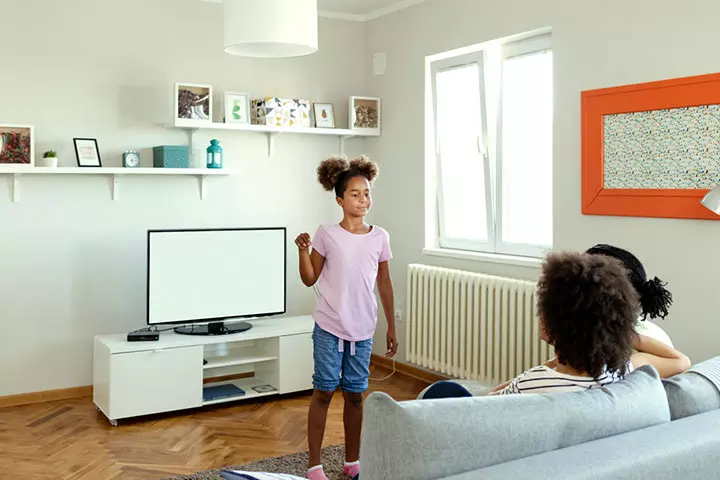
Image: IStock
This game involves a combination of communication types to develop comprehension and presentation skills. It can help your child fine-tune their communication abilities using facial expressions.
To play, take a few chits and write emotional scenarios on them. The scenarios should be light and age-specific, such as losing your pencil box, wearing your favorite dress, waiting for the school bus, or snooping into your friend’s bag. Each child gets a scenario, and acting while speaking is not allowed.
After they guess the scenario, discuss the emotional response. This activity can help children express their feelings about specific situations.
8. ‘Guess what I am thinking of’
This game begins with all players sitting in a circle. At the center of the circle sits a player, termed the “thinker.” The thinker starts the game by saying, ‘I am thinking of a thing (or someone), which (or who) is an animal (or person/thing/place/plant/food/occupation).’ The other children have to try and identify what the thinker is thinking by asking questions. The thinker can respond only with a ‘Yes’ or a ‘No.’ If no one guesses the answer, the thinker is declared the winner.
9. Identify the described
This game is a fun way to enhance your child’s comprehension and interpretation skills. To play, you would need about four to five children. Blindfold one child while giving an object to the rest.
All the children, except the one who has been blindfolded, should describe a characteristic of the item. The blindfolded child has to guess the item by understanding the verbal description. If needed, the blindfolded child may request additional clues by asking questions.
10. Trolley challenge
This super fun activity keeps your child amused while helping improve their communication skills as you go around the supermarket. In this game, you ask your child to tell three things about every item you add to the shopping cart. For example, if you pick a water bottle, the child might say – it is a plastic bottle with a transparent base and a blue cap. This activity is a hands-on way to develop diction, an important part of oral communication.
11. Changing the leader
Changing the leader is a delightful game for kids that combines enjoyment with valuable lessons in non-verbal communication. To play, form a circle. Then, designate the initial leader through a fun game or random selection. The chosen leader begins with a simple action, and the others copy them. The fun twist lies in non-verbal leadership transfer – the leader silently designates the next through gestures like a wink or nod. The child receiving the signal becomes the new leader, changing the action at will. This fun activity can help encourage creativity in children as each child takes turns leading. Children will also learn to pay attention to non-verbal cues, which can help foster adaptability and cooperation.
12. Complete the nursery rhyme
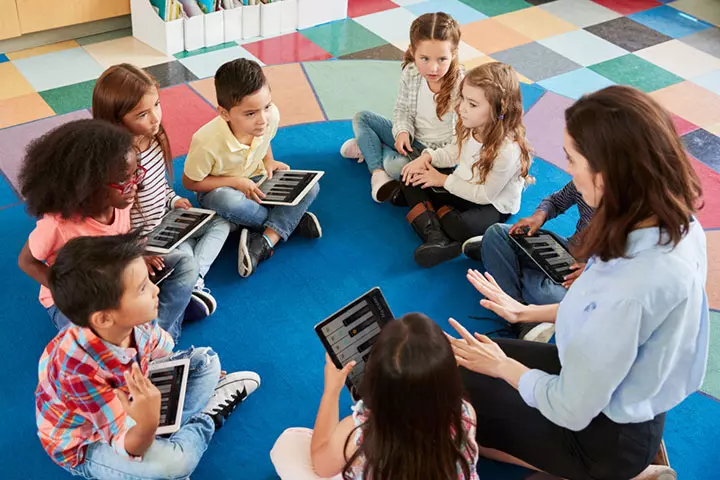
Image: Shutterstock
We are all familiar with the Finish the Story game, where each child in a group adds a new word to create a unique story. Complete the Nursery Rhyme is a fun and creative variation of this concept. In this game, the child is asked to pick their favorite nursery rhyme and think of alternate ways to end it. Encourage them to think of creative ways to end the poem, such as by using rhyming words. The game can help improve their communication skills by making them think of words that complement the underlying story of the poem.
13. Use open-ended questions
In addition to encouraging the child to communicate more, open-ended questions can help you learn about what they do at school or play dates. In this verbal game for kids, ask the child questions that require detailed answers instead of a simple yes or no.
Some examples of open-ended questions include, ‘What was the most fun thing you did today?’ ‘What was your favorite part of the story we read?’ ‘What made you laugh today?’ Overall, this activity is a good way to make the child think about what they did the entire day and describe it in detail.
14. Story cubes
This exciting game can help enhance your child’s communication, imagination, and artistic skills. To play this game, the child has to make a few paper cubes and then draw their favorite things or stick pictures on all sides of the cubes. In the next step, the child has to roll/throw the cubes and start narrating a story based on the image or drawing that shows up. The process of throwing the dice and adding content to the story continues until the story comes to a proper end.
15. Journaling
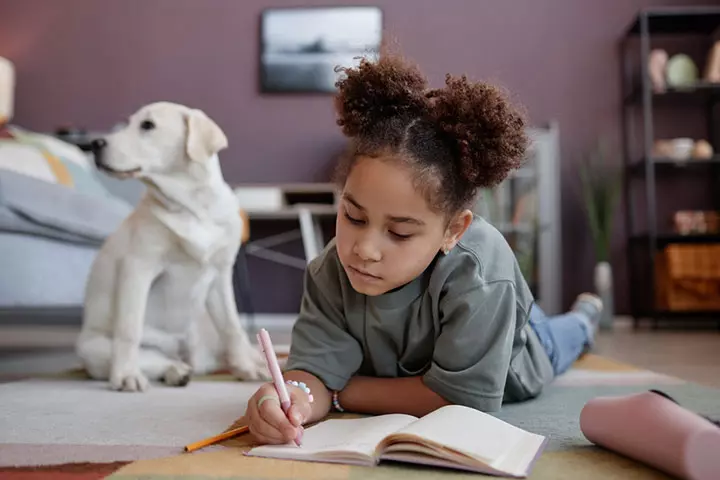
Image: Shutterstock
Journaling can help a child identify things that bother them and things that make them happy. This can, in turn, help them manage their emotions and communicate better (2). For this communication activity for kids, get a pen or pencil and a diary in which the child can jot down their thoughts. You should also encourage the child to journal every day and review it every few days to identify how they can improve the way they communicate their feelings.
16. Scavenger hunt
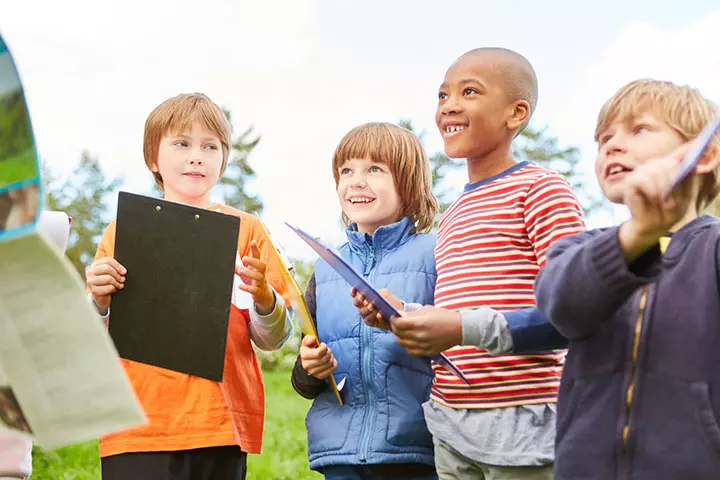
Image: Shutterstock
Children love running around, and this scavenger hunt activity can fully engage them. To play this game, children have to speak to each other to decode hints and communicate clearly to be the first ones to find the treasures.
You may give children a list of everyday items, such as flowers, kitchen utensils, or toys, that they need to find. Ask them to describe the items in the end.
17. Make a recipe together

Image: Shutterstock
Apart from keeping them engaged and satiating hunger pangs, cooking is an excellent activity to teach kids how to communicate and bond with them. Help them cook their favorite dish and familiarize them with the names of the utensils, ingredients, and condiments. Then, ask them questions such as, ‘What spice is to be added now?’ ‘Which utensil should I use?’ ‘What is the next step in this recipe?’ This hands-on process can help enhance the child’s vocabulary and teach them the importance of arranging and communicating their thoughts to achieve the desired results.
Why Do Children Struggle With Effective Communication?
Various interrelated factors could be responsible for your child’s communication problems. However, some of the basic reasons could be
- Absence of guidance: Learning and practicing effective communication skills needs hand-holding. Young children mostly learn by observing their peers and families. So, be their role model and help them with the art of communication. Oral language skills or oratory skills are best developed with regular interactions with each other. Thus, establish positive interactions with your child frequently. Children mirror their parents a lot of the time, so it is important to communicate with them correctly.
- Increased screen time: Children in the 8-18 age group spend almost seven hours a day on screens. Experts consider it one of the reasons for poor communication development in children (3).
- Communication disorders: Disorders such as speech-sound disorder or social communication disorder could affect a child’s ability to communicate (4). A communication disorder may be developmental or physical. This issue can be managed with the help of an expert who would trace the root of the issue and then treat it accordingly.
Smrithy Rajesh, a mother, shares her experience helping her son with autism develop his communication skills. She says, “I created two picture cards of his favorite food and stuck them in front of my kitchen wall. In the beginning, I was physically prompting him to pick up cards and hand them over to me (or another communication partner). I would hide his favorite food items to use the cards effectively. Within a week, he started using those two cards independently to communicate what he wanted.
“Then I introduced other pictures, of things like milk, juice, music…one by one. When he started communicating with all the pictures from the strip, I stuck them all in a big file on different pages. I was using his pictures to make cards. On the left side of the file, I attached an ‘I want’ strip, and taught him to pick the picture and use it with ‘I want’ strip. At that time, I was using only ten pictures. After a month, he started communicating using ‘I want’ strip (i).”
Some other reasons that could affect a child’s communication skills are hearing problems, stuttering, and unclear speech. In such cases, professional advice and guidance are required.
Tips To Support Your Child In Developing Effective Communication Skills
As a parent, you could practice the following tips to help your child overcome communication issues (5). The following tips are simple and require minimal effort.
- Encourage your child to talk so that they feel comfortable sharing their feelings, thoughts, and ideas. Make them feel that approaching you for communication is easy.
 Point to consider
Point to consider- Listen to your child, understand, and respond sensitively. Address their feelings of anger, embarrassment, sadness, and fear with the same vigor as you would do when they share something good with you.
- Avoid interrupting your child when they are communicating because this is what you expect your child to do when you are talking. Thus, to teach them how to be a patient listener, you need to be a patient listener.
- Do not be judgmental as there may be some issues that might look insignificant to you, but for your child, they might be grave.
- Do not be overly critical, and do not try to correct all the communication problems at once.
- Focus on body language and tone. This is crucial to help them understand what is not said. Children can be secretive about their issues, especially the ones that embarrass them.
- Provide them with moral support and ensure that you have their back. Try to get involved with them in the issue and help them resolve it by setting the right examples.
Interacting with children could help them overcome social and communication issues. It can also help them realize the value of productive conversation. However, if a child has chronic communication issues that seem difficult to manage, then consulting an expert could be wise.
Frequently Asked Questions
1. What are the 7 Cs of communication?
The seven Cs of communication are correctness, clarity, concreteness, courtesy, completeness, consideration, and conciseness.
2. What are the effects of poor communication skills?
The common problems that can arise due to poor communication skills are misunderstandings, conflicts, lack of trust, reduced confidence, and time management issues. However, with support from parents and teachers, any kid can overcome communication issues and lead a life of happiness and confidence.
3. How can technology impact a child’s communication development?
Speed and language development depend on verbal interaction. Children communicate by talking to others, reading, and singing. When they spend excessive time on technology devices, they miss the opportunity to interact with real people. As a result, it negatively affects their language development.
4. How do children learn to communicate?
A child learns to communicate by exploring their environment and observing people. They also develop their communication skills by taking turns in games, talking, and repeating things. Listening, speaking, gesturing, reading, and writing are key elements of communication development that continue throughout life (6).
5. What are the basic principles of good communication?
The principles of good communication can vary depending on various factors. One of the most common principles involves clearly defining what you intend to communicate, then taking into account the expectations of your audience, and finally presenting the information systematically and clearly.
6. At what age should I start teaching my child communication skills?
You can start teaching communication skills from birth. Babies learn through eye contact, smiles, and sounds. As they grow, talk, read, and respond to them to encourage communication. Simple games and storytelling help toddlers build these skills even more. Early interaction lays a strong foundation for good communication.
7. How can I tell if my child has communication difficulties?
You may notice communication difficulties in your child if they have delayed speech, struggle to follow simple instructions, or have trouble expressing themselves clearly. If these signs appear, consider consulting a pediatrician or speech therapist for support (7).
The benefits of good communication skills for kids are numerous, and they allow children to express their feelings clearly and learn more effectively. As a parent, you can guide and encourage your child to practice their interpersonal skills daily. You can also involve your children in communication games and activities such as the telephone game, picture storytelling, impromptu, and word games for kids. These games will teach them the principles of communication in a fun way. Try not to be harsh or judgmental toward your children when doing any of these activities. Instead, encourage them and respond to them sensitively. Further, if you notice any developmental issues, do not hesitate to consult a professional.
Infographic: Tips To Support Your Child In Developing Communication Skills
Some children are naturally expressive, while others struggle to connect with people and communicate. If you have noticed your child often withdrawing from conversations and suppressing their emotions, help them open up and develop better communication skills. Make them read this infographic, so they learn to make friends and have stable mental health. Illustration: Momjunction Design Team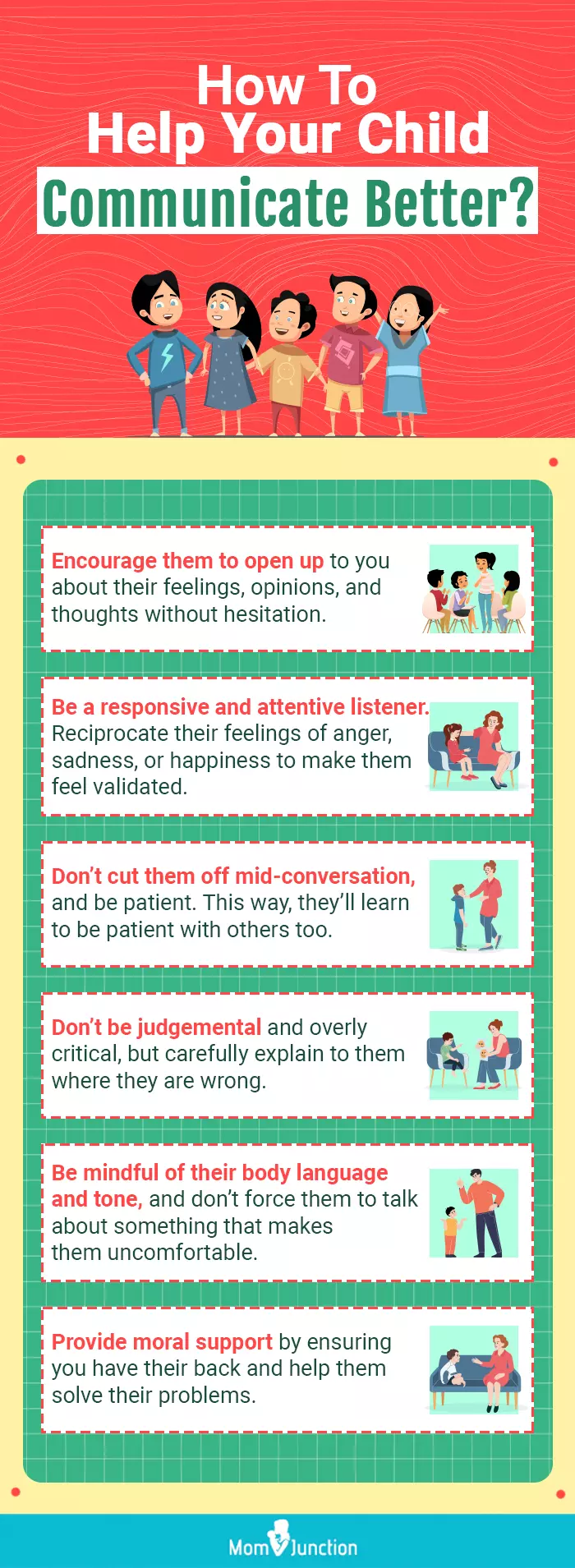
Illustration: Communication Skills For Kids: Imporatnce Tips And Games
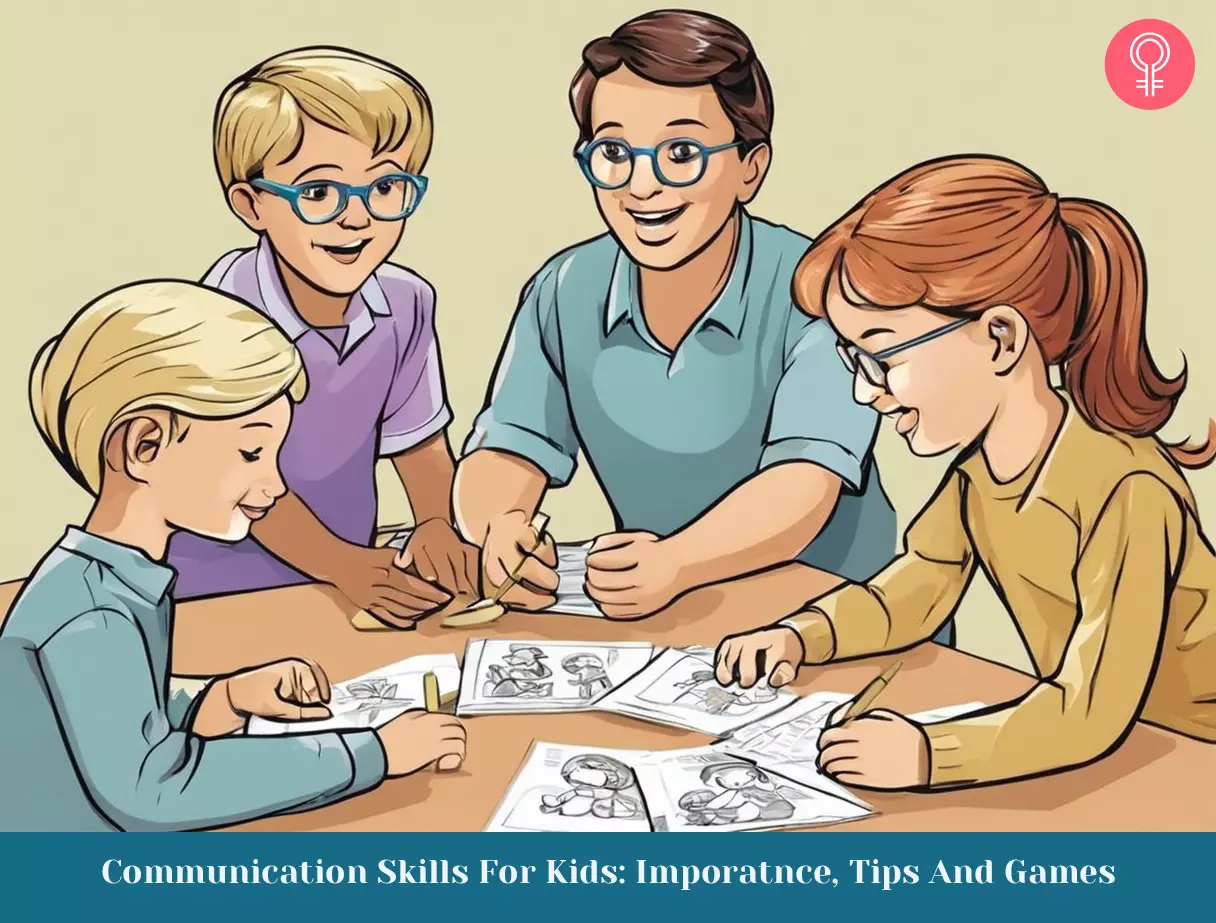
Image: Stable Diffusion/MomJunction Design Team
Developing your child’s communication skills is a task of utmost importance for parents. Watch this video to learn how back-and-forth interactions will help.
Personal Experience: Source
MomJunction articles include first-hand experiences to provide you with better insights through real-life narratives. Here are the sources of personal accounts referenced in this article.
i. How I developed communication skills in my son- Advaith;https://smrithyrajesh.blogspot.com/2017/05/how-i-developed-communication-skills-in.html
References
- Caroline Gooden and Jacqui Kearns; The Importance of Communication Skills in Young Children; Institute of Educational Sciences
https://files.eric.ed.gov/fulltext/ED574738.pdf - Journaling for emotional wellness
https://www.urmc.rochester.edu/encyclopedia/content.aspx?ContentID=4552&ContentTypeID=1 - Screen Time May Affect Social Interaction Skills in Children; Winchester Hospital
https://winchesterhospital.org/health-library/article?id=907792 - Communication Disorders; St. Louis Children’s
https://www.stlouischildrens.org/conditions-treatments/communication-disorders - Communicating well with children: tips; Raising Children
https://raisingchildren.net.au/toddlers/connecting-communicating/communicating/communicating-well-with-children - Developing Communication Abilities; NCIP Library
https://www2.edc.org/ncip/library/ec/power_7.htm#:~:text=Children%20develop%20these%20more%20adult - Communication Disorders in Children
https://www.urmc.rochester.edu/encyclopedia/content.aspx?contenttypeid=90&contentid=p02559
Community Experiences
Join the conversation and become a part of our nurturing community! Share your stories, experiences, and insights to connect with fellow parents.
Read full bio of Dr. Maymunah Yusuf Kadiri
Read full bio of Harshita Makvana
Read full bio of Deepa Thomas
Read full bio of Apoorva K













